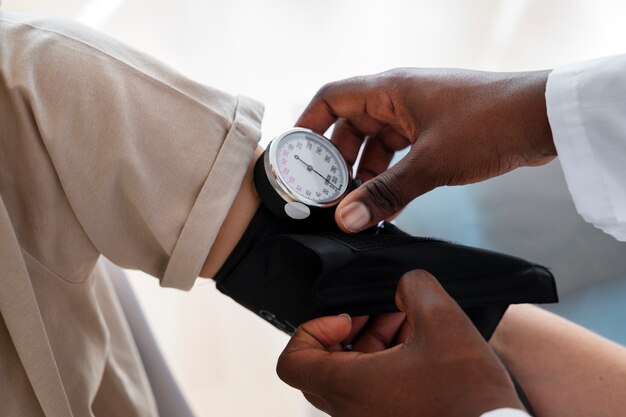Your Guide to What Is Hypertensive Crisis
What You Get:
Free Guide
Free, helpful information about HyperTension FAQ and related What Is Hypertensive Crisis topics.
Helpful Information
Get clear and easy-to-understand details about What Is Hypertensive Crisis topics and resources.
Personalized Offers
Answer a few optional questions to receive offers or information related to HyperTension FAQ. The survey is optional and not required to access your free guide.
Understanding Hypertensive Crisis: What You Need to Know
A sudden spike in blood pressure can be more than just a headache or a slight inconvenience; it could be a hypertensive crisis, a severe medical emergency that requires immediate attention. But what exactly does a hypertensive crisis entail, and why is it so crucial to address it promptly?
What Is a Hypertensive Crisis?
A hypertensive crisis occurs when blood pressure rises quickly and severally, potentially leading to serious health consequences such as stroke, heart attack, or kidney damage. This condition is usually categorized into two types:
Hypertensive Urgency: This occurs when blood pressure readings are extremely high, typically over 180/120 mmHg, but without any accompanying organ damage. While not immediately life-threatening, it requires medical intervention to prevent complications.
Hypertensive Emergency: This is when high blood pressure readings are accompanied by evidence of progressive organ damage. Immediate hospitalization and treatment are necessary to mitigate the risk of severe outcomes such as brain hemorrhage or heart failure.
Recognizing the Signs
Identifying a hypertensive crisis quickly is critical. Symptoms that might indicate you're experiencing this include:
- Severe headache
- Shortness of breath
- Chest pain
- Vision problems
- Nausea or vomiting
- Anxiety or confusion
If these symptoms occur, especially alongside high blood pressure readings, seeking immediate medical attention is essential.
Causes and Risk Factors
Several factors can trigger a hypertensive crisis, including:
- Missing doses of blood pressure medications
- Stress
- Certain medications
- Drug use
- Chronic conditions such as kidney or thyroid disorders
Those with existing high blood pressure are at higher risk, reinforcing the importance of regular monitoring and consistent medication adherence.
Prevention Tips
Avoiding hypertensive crises largely involves lifestyle and medication management:
- Monitor your blood pressure regularly.
- Adhere strictly to your prescribed medications.
- Manage stress through activities like yoga or meditation.
- Limit salt intake and maintain a balanced diet.
- Exercise regularly, but consult with a doctor to ensure safe activity levels.
Exploring Financial and Educational Resources
Dealing with a hypertensive crisis can extend beyond health implications to financial burdens, especially if frequent medical care is required. Navigating the financial impact is critical to long-term management and health support. Here are some resources that might help ease the financial strain:
Government Aid Programs: Many government health programs can assist with medical bills and prescriptions, such as Medicare or Medicaid. Consider applying if you qualify, to ensure vital medical expenses are covered.
Financial Assistance Programs: Consult hospitals or local health departments about patient assistance programs tailored to ease hospital bills and manage prescription costs.
Debt Relief Options: If medical bills accumulate beyond your means, consider reaching out to debt relief agencies to negotiate or consolidate payments.
Credit Card Solutions: Some credit cards offer medical expense coverage options. Review these offers to find supportive solutions for unanticipated medical expenses.
Educational Grants and Seminars: Engaging in educational seminars or seminars can provide insight into managing high blood pressure and ensure you remain informed on best practices.
Ensuring you are supported financially can significantly reduce stress, helping you focus on maintaining your health and well-being.
Financial and Educational Resources to Consider
- 🏥 Medicare/Medicaid: Provides substantial coverage for those eligible, alleviating the cost of long-term medical care.
- 💰 Patient Assistance Programs: Offered by hospitals to alleviate medical expenses; inquire with local facilities.
- 📉 Debt Relief Agencies: Negotiate bills and consolidate payments. Critical for managing overwhelming medical expenses.
- 💳 Credit Card Offers: Some cards provide medical expense options; review carefully for the best fit.
- 🎓 Health Seminars: Available online or in community centers; stay informed about managing blood pressure effectively.
Addressing hypertensive crises requires a blend of medical management and financial preparedness. Being proactive about both health and fiscal responsibility will equip you not just to manage an immediate crisis, but also to safeguard against future risks.
What You Get:
Free HyperTension FAQ Guide
Free, helpful information about What Is Hypertensive Crisis and related resources.

Helpful Information
Get clear, easy-to-understand details about What Is Hypertensive Crisis topics.

Optional Personalized Offers
Answer a few optional questions to see offers or information related to HyperTension FAQ. Participation is not required to get your free guide.


Discover More
- a 66 Year Old Female With a History Of Hypertension
- Are Eggs Bad For Hypertension
- Are Eggs Good For Hypertension
- Are Endocrine Disorders Causing Hypertension Rare
- Can Adderall Cause Hypertension
- Can Alcohol Cause Hypertension
- Can Allergies Cause Hypertension
- Can Anemci People Get Hypertension
- Can Anemia Cause Hypertension
- Can Antibiotics Cause Hypertension
